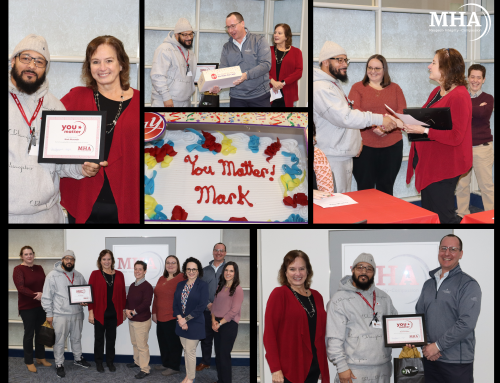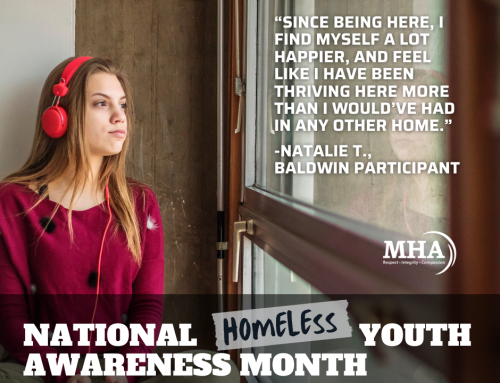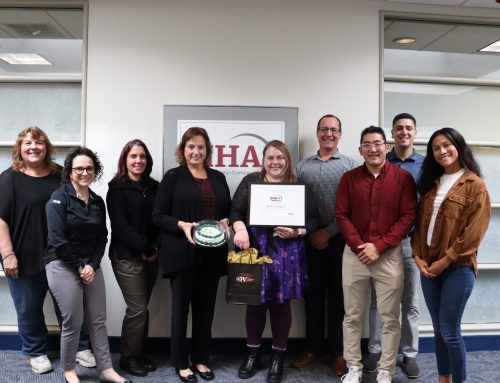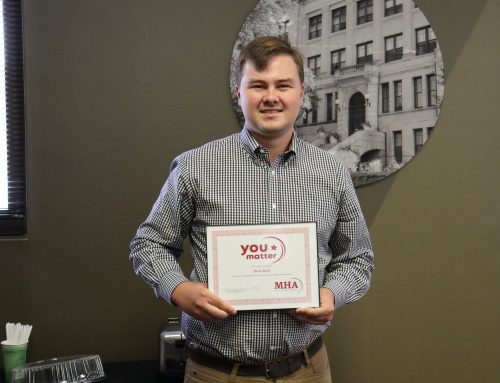Twelve years ago, Amber Metcalf’s life changed in an instant. “I was putting in a tire swing for the kids to use at a Labor Day picnic,” Amber recalled. “I fell 30 feet out of the tree, shattered my spine, severed my spinal cord in three places and became a paraplegic. Eventually, due to infection, my right leg was amputated up past my hip.”
Amber is frank about what the accident meant for her. “I experienced heavy depression and a lot of drug use,” she said. “That’s me in a nutshell.” Her serious health care needs found Amber placed in a nursing home, where excess treatment had her addicted to morphine. Through sheer strength of will, Amber brought herself down off morphine at home.
“I’m in recovery, clean for four years now,” she said. “MHA has helped a lot with that. I need to be in a stable environment, and the house I live in now provides that.” Amber lives in Ludlow, in a New Way residence, MHA’s innovative community alternative to institutional care in a nursing home. Living with three other disabled residents, all supported by 24/7 staff, Amber’s life is greatly improved over the nursing homes where she spent so many years. “The people I live with face challenges from a brain injury, but with my health conditions, the care and environment here are right for me. I wake up really early in the morning, roll around in my room to get organized for my day. We have a special accessible garden box that’s right outside my French doors. Last year we planted tomatoes, beans, peppers, and some flowers. I want to do that again.”
Amber is a vital and sometimes loud advocate for people with disabilities. What motivates her to help in this way? “I lived for years in nursing homes, usually on dementia floors for them not knowing where to put me,” she explained. “Look, I don’t like to see people in pain, I don’t like to see people talked to like babies, and I don’t like to see people bullied. My mother says I was born without a filter, and when I see something that’s not right, I speak up. The staff here at the house are great, but you know what? They go home after work. Not me, I’m here all day, and if I can help staff understand things about the people I live with, they hear from me.”
“Since the day I met Amber, she’s always been that person who looks out for everybody else,” said Ebonie Bethea, Program Supervisor. “Amber’s been in residential programs and lived in nursing homes, so she can observe the dynamic with staff from a resident’s point of view. Her life experience provides a unique perspective and to her great credit she applies it on behalf of her peers. She’ll say, ‘Here is what this woman’s trying to tell you,’ and it can be really helpful, positive input for our staff. We call Amber our Communication Log because she knows everything that’s going on here. I appreciate everything about her. We have high hopes that she will accept our offer to run a new crafts group at the Resource Center once COVID protocols allow in-person programming again. People are so drawn to Amber, they’ll be lining up at the door.”
“Before COVID I used to go to the Resource Center, but for now we’re more confined to the house,” Amber said. “Every week the Resource Center sends out packets of things to do. I like the mind exercises, but what I wouldn’t do to be able to go to the library! I’ve had my second COVID shot, so I’m good now, but we still have to wait until it’s safe for the library to open. We have to be patient. I know you need to be patient with people who have a brain injury and it’s no different with people like me in recovery and rolling in a wheelchair. We’re all human. We get frustrated and sometimes we have bad days, but we’re human. We all deserve to be treated with respect. Living here, we get that.”





